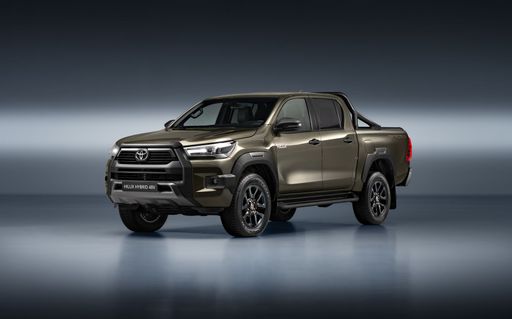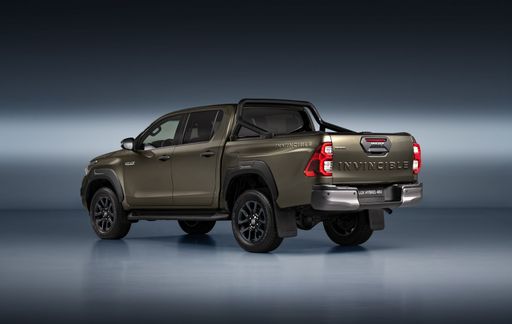Peugeot 208 VS Toyota Hilux – Specs, Efficiency & Price Comparison
Which model is the better choice – the Peugeot 208 or the Toyota Hilux? We compare performance (156 HP vs 204 HP), boot capacity (352 L vs ), efficiency (14 kWh4.50 L vs 8.70 L), and of course, the price (20200 £ vs 39800 £).
Find out now which car fits your needs better!
The Peugeot 208 (Hatchback) is powered by a Petrol MHEV, Petrol or Electric engine and comes with a Automatic or Manuel transmission. In comparison, the Toyota Hilux (Pickup) features a Diesel or Diesel MHEV engine and a Automatic or Manuel gearbox.
When it comes to boot capacity, the Peugeot 208 offers 352 L, while the Toyota Hilux provides – depending on what matters most to you. If you’re looking for more power, you’ll need to decide whether the 156 HP of the Peugeot 208 or the 204 HP of the Toyota Hilux suits your needs better.
There are also differences in efficiency: 14 kWh4.50 L vs 8.70 L. In terms of price, the Peugeot 208 starts at 20200 £, while the Toyota Hilux is available from 39800 £.
Compare all the key specs now and find out which model fits your lifestyle best!
Peugeot 208
The Peugeot 208 exudes a distinctive French charm, combining sleek lines with an assertive stance on the road. Inside, it offers a modern and sophisticated cabin, complete with intuitive technology and high-quality finishes to enhance the driving experience. Its agile handling and efficient performance make it a delightful choice for both city commuting and longer journeys.
details @ www.media.stellantis.com
@ www.media.stellantis.com
 @ www.media.stellantis.com
@ www.media.stellantis.com
 @ www.media.stellantis.com
@ www.media.stellantis.com
 @ www.media.stellantis.com
@ www.media.stellantis.com
Toyota Hilux
The Toyota Hilux has long been celebrated for its remarkable durability and reliability, making it a favourite among those needing a robust vehicle for rugged terrains. Known for its unyielding performance, the Hilux combines practicality with a surprisingly comfortable driving experience, both on and off the road. With its distinctive design and advanced safety features, it continues to be a versatile choice for adventurers and professionals alike.
details @ toyota-media.de
@ toyota-media.de
 @ toyota-media.de
@ toyota-media.de

|

|
|
|
|
Costs and Consumption |
|
|---|---|
|
Price
20200 - 35100 £
|
Price
39800 - 56200 £
|
|
Consumption L/100km
4.5 - 5.2 L
|
Consumption L/100km
8.7 - 10 L
|
|
Consumption kWh/100km
14 - 15.4 kWh
|
Consumption kWh/100km
-
|
|
Electric Range
362 - 432 km
|
Electric Range
-
|
|
Battery Capacity
46 - 51 kWh
|
Battery Capacity
-
|
|
co2
0 - 117 g/km
|
co2
227 - 264 g/km
|
|
Fuel tank capacity
44 L
|
Fuel tank capacity
80 L
|
Dimensions and Body |
|
|---|---|
|
Body Type
Hatchback
|
Body Type
Pickup
|
|
Seats
5
|
Seats
4 - 5
|
|
Doors
5
|
Doors
2 - 4
|
|
Curb weight
1165 - 1530 kg
|
Curb weight
2085 - 2185 kg
|
|
Trunk capacity
265 - 352 L
|
Trunk capacity
-
|
|
Length
4055 mm
|
Length
5325 mm
|
|
Width
1745 mm
|
Width
1855 mm
|
|
Height
1430 mm
|
Height
1810 - 1815 mm
|
|
Payload
380 - 430 kg
|
Payload
1025 - 1125 kg
|
Engine and Performance |
|
|---|---|
|
Engine Type
Petrol MHEV, Petrol, Electric
|
Engine Type
Diesel, Diesel MHEV
|
|
Transmission
Automatic, Manuel
|
Transmission
Automatic, Manuel
|
|
Transmission Detail
Dual-Clutch Automatic, Schaltgetriebe, Reduction Gearbox, Automat. Schaltgetriebe (Doppelkupplung)
|
Transmission Detail
Automatic Gearbox, Automatikgetriebe, Schaltgetriebe
|
|
Drive Type
Front-Wheel Drive
|
Drive Type
All-Wheel Drive
|
|
Power HP
101 - 156 HP
|
Power HP
150 - 204 HP
|
|
Acceleration 0-100km/h
8.3 - 10.9 s
|
Acceleration 0-100km/h
10.7 - 12.8 s
|
|
Max Speed
150 - 200 km/h
|
Max Speed
170 - 175 km/h
|
|
Torque
205 - 270 Nm
|
Torque
400 - 500 Nm
|
|
Number of Cylinders
3
|
Number of Cylinders
4
|
|
Power kW
74 - 115 kW
|
Power kW
110 - 150 kW
|
|
Engine capacity
1199 cm3
|
Engine capacity
2393 - 2755 cm3
|
General |
|
|---|---|
|
Model Year
2023 - 2025
|
Model Year
2020 - 2025
|
|
CO2 Efficiency Class
C, D, A
|
CO2 Efficiency Class
G
|
|
Brand
Peugeot
|
Brand
Toyota
|
Peugeot 208
A Glimpse into the Future: The New Peugeot 208
The Peugeot 208, with its sleek design and innovative features, continues to set benchmarks in the automotive industry. As a hatchback, it seamlessly blends style with practicality, offering the perfect solution for urban driving and long-distance travels alike. In this article, we delve into the technical details and innovations that distinguish the latest iterations of the Peugeot 208.
Engine Options: Efficiency Meets Performance
The Peugeot 208 provides an array of engine options catering to different driving preferences. Featuring both petrol Mild-Hybrid technology and full electric powertrains, it offers a versatile range designed to accommodate eco-conscious drivers as well as those who prioritise performance.
With power outputs ranging from 101 PS to 156 PS, and a torque span of 205 Nm to 270 Nm, these machines are meticulously engineered to provide thrilling yet efficient drives. The petrol versions utilise a three-cylinder 1199 cm³ engine, optimising fuel consumption between 4.7 and 5.4 L/100km, while the electric e-208 models boast an impressive range of up to 410 km on a single charge.
Advanced Transmission Systems
The Peugeot 208 models come equipped with an advanced automatic transmission system, employing either a dual-clutch automatic gearbox or a manual transmission, depending on the chosen variant. These systems guarantee smooth gear transitions, thus enhancing driving pleasure and overall efficiency.
Performance and Environmental Considerations
From a performance standpoint, the Peugeot 208 impresses with its ability to accelerate from 0 to 100 km/h in between 8.3 to 10.9 seconds, depending on the model chosen. This level of performance is complemented by a top speed ranging from 150 to 200 km/h, ensuring that the 208 is more than capable of holding its own on the motorway.
With environmental consciousness at the forefront, the vehicle's CO2 efficiency class ranges from A to D, further establishing the Peugeot 208 as a responsible option for modern drivers keen on reducing their carbon footprint.
Comfort and Practicality: A Class Act
The interior of the Peugeot 208 reflects its exterior's stylish flair. It comfortably seats five passengers and offers a boot capacity of 265 to 309 litres, accommodating both city commutes and weekend getaways. Advanced comfort features and a state-of-the-art infotainment system ensure that rides are as enjoyable for passengers as they are for the driver.
Cost Considerations
The Peugeot 208 manages to strike a remarkable balance between cost efficiency and luxury. With prices ranging from €22,950 to €40,825, there is a variant to suit most budgets while still providing a premium experience. Additionally, the monthly costs and costs per kilometre are kept in check, making it an economically sound choice in the long term.
Dimensions and Design: Compact yet Spacious
Measuring 4,055 mm in length, 1,745 mm in width, and 1,430 mm in height, the Peugeot 208 maintains a compact profile that is perfectly suited to tight urban environments. Despite its manageable size, it offers ample space inside, thanks in part to clever design and engineering.
Conclusion: A Future-Proof Choice
The Peugeot 208 is a testament to modern automotive innovation. Whether powered by traditional engines or fully electric powertrains, it consistently delivers on performance, efficiency, and style. The combination of cutting-edge technology and sustainable practices places the Peugeot 208 as a forward-thinking choice for drivers seeking a vehicle that epitomises the best of contemporary motoring.
Toyota Hilux
Discover the Iconic Toyota Hilux: A Blend of Robustness and Innovation
The Toyota Hilux is a name synonymous with durability and reliability, making it a favourite in the pick-up market. But beyond its rugged exterior, the Hilux offers a multitude of technological advancements and engineering marvels that are worthy of exploration. In this article, we'll delve into the details that make the Toyota Hilux a remarkable vehicle in its class.
Engineering Excellence: Under the Hood of the Hilux
The Toyota Hilux is powered by a 2.4-litre D-4D diesel engine, delivering a robust 150 PS and a torque of 400 Nm. This engine configuration ensures that the Hilux maintains impressive pulling power and performance, be it on or off the road. The vehicle is equipped with an automatic 4x4 transmission, which enhances its off-road capabilities while ensuring a smooth ride on urban pavements.
Despite its powerful performance, the Hilux is relatively efficient for a vehicle of its size, offering a consumption rate of 8.7 L/100km. The 80-litre fuel tank capacity ensures fewer stops on longer journeys, making it a reliable companion for adventure seekers.
Structural Strength and Versatility
What sets the Hilux apart is its build quality. With a length of 5325 mm, width of 1855 mm, and height of 1815 mm, the Toyota Hilux embodies a commanding presence. It is designed to handle a payload of up to 1025 kg, making it a perfect choice for those requiring a tough utility vehicle without compromising on comfort and style. Moreover, its 5-seat capacity ensures that it's as comfortable for passengers as it is practical for cargo.
Innovative Features for Enhanced Comfort and Safety
The Toyota Hilux is equipped with a plethora of features aimed at enhancing driver and passenger comfort and safety. Its "Comfort 4x4 Automatik" line includes modern technological integrations, such as advanced infotainment systems and driver assistance features. This line of improvements ensures that every journey in the Hilux is as pleasurable as it is safe.
In terms of safety standards, the Hilux does not compromise. It comes packed with a range of driver assistance systems, ensuring a secure drive in both urban and off-road environments. Though it scores a CO2 efficiency class of G, plans for future iterations of the Hilux aim to incorporate more eco-friendly technologies.
Conclusion: The Toyota Hilux Legacy
The Toyota Hilux continues to be a cornerstone in the pick-up truck market, offering reliability, power, and innovation. With its blend of engineering excellence, versatile design, and cutting-edge features, the Hilux stands its ground as a leader in its category. Whether you are navigating city streets or exploring the wild, the Toyota Hilux is engineered to handle it all with grace and strength.
The prices and data displayed are estimates based on German list prices and may vary by country. This information is not legally binding.
